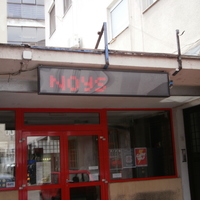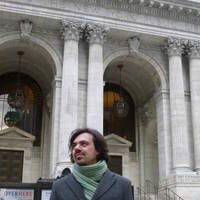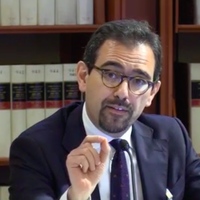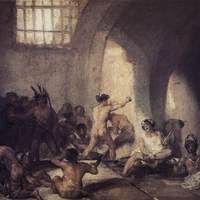Papers by Jennifer Ballengee
SUNY Press eBooks, Jan 21, 2009
SUNY Press eBooks, Jan 21, 2009
SUNY Press eBooks, Jan 21, 2009
SUNY Press eBooks, Jan 21, 2009
SUNY Press eBooks, Jan 21, 2009

At the close of Oedipus at Colonus (c. 401 BC), the last extant play of Sophocles and his final t... more At the close of Oedipus at Colonus (c. 401 BC), the last extant play of Sophocles and his final treatment of the myth of Oedipus' accursed family, a strange dramatic event occurs. As the thunder of Zeus peals overhead, Oedipus' body, located somewhere offstage, disappears forever, simultaneously bestowing a remarkable power upon the site where he departs from earthly life. Perhaps stranger still, for the form of the drama, are the responses that Theseus and Antigone have to the catastrophe. According to the messenger who reports the details of Oedipus' death to the chorus (and the watching audience), the epic hero who alone among humans has permission to witness Oedipus' passing actually fails to see the singular event: And when we had departed, after a short time we turned around, and could see that the man [Oedipus] was no longer present, and the king [Theseus] was shading his eyes, holding his hand against his head, as though some terrible, terrifying thing, unbearable to see, had been presented. ως δ' απήλθομεν, χρόνω βραχεί στραφέντες, εξαπείδομεν τον άνδρα τον μεν ουδαμού παρόντ' έτι, άνακτα δ'αυτόν ομμάτων επίσκιον χείρ' αντέχοντα κρατός, ως δεινού τινος COLLOQUY text theory critique 11 (2006).

NANO, May 1, 2014
This NANO note will examine the tension between representation, memorial, and the catastrophe of ... more This NANO note will examine the tension between representation, memorial, and the catastrophe of death that emerges in the space of tragedy, as the problem arises in two quite different works: Oedipus at Colonus, a fairly typical fifth-century Greek tragedy, and Falling Man, Don DeLillo's novel that, in its attempt to address the events of 9/11, reflects in form and subject matter many of Aristotle's terms of tragic representation. It is not the intent of this note to engage with the recent proliferation of work in "performance theory." Rather than being concerned with an imagined exchange between audience and actor, this study examines how the supplementary relationship of gesture and speech in tragedy disrupts the public/private distinction, and how this articulation effects and enables the public memorialization of death. Thus, this paper will consider the representation of death as an event whose catastrophic, and somewhat mysterious, collision of the public and the private lends it its tragic significance.

Journal of Cultural Geography, Jun 1, 2010
In Mediterranean Crossings, Iain Chambers turns a gaze informed by postcolonial theory, post-stru... more In Mediterranean Crossings, Iain Chambers turns a gaze informed by postcolonial theory, post-structuralism, and discourse analysis to examine what he identifies as a colonizing myth of ‘‘the Mediterranean.’’ As his study reveals, the story of ‘‘the Mediterranean’’ promoted by Renaissance humanism, and which persists today in the Western world, erases the distinct diversity of ethnicities, religions, and cultures found living in lands surrounding the Mediterranean Sea. Instead, he argues, the myth functions as a lifeless and stagnant metaphor, firmly cementing any sense of the Mediterranean world to the ruins of ancient Greek and Roman culture. Chambers thus provides a study that overturns the petrified edifice of that homogenizing story of this ancient region and reveals the myriad of hidden forces, labors, influences, and people that actually occupy and traverse the area. The book should thus be required reading for historians, classicists, or political scientists—but particularly for cultural geographers, since what Chambers has produced is really a cultural geographic examination of the region. Chambers replaces the Cartesian ‘‘map’’ of the Mediterranean with a Deleuzian ‘‘fluid and fluctuating composition’’ (p. 2), revealing the differences, transformations, erasures, and appropriations that have been relegated to the margins of the Western European myth of the Mediterranean. His study examines the means by which the borders and apparent symmetry of the physical map belie the cultural mix which unfolds in flows and currents across and around the Sea. Examining overlapping and intertwined cultures, territories, and histories in the manner of Edward Said, Chambers addresses the Mediterranean as a postcolonial subject, a geographic region colonized by a particular Western European ideal. He argues that political entities such as individual states and the European Union have imposed systems of statehood, property, and land and water rights onto the region in a manner that, while legal, elides the legal factor of human rights. With wide-ranging cultural examples, Chambers demonstrates how certain groups have been subject to both cultural and legal normalization via a combination of political and economic forces. The nation-state thus manages ‘‘the flow not so much of private individuals as of labor, skills, and competences in a complex symbiosis with the ‘laws’ of the ‘free’ market and its planetary developments.’’ (p. 4). Journal of Cultural Geography Vol. 27, No. 2, June 2010, 229 238

Yale Journal of Criticism, 2001
's role as co-founder of Yale University's Fortunoff Archive for Holocaust Testimonies and his co... more 's role as co-founder of Yale University's Fortunoff Archive for Holocaust Testimonies and his continued involvement with the Archive have provided the catalyst for his work on video testimony. While such considerations may seem far from the studies of Wordsworth that marked the beginning of his career, an interest in vision and the visual, as well as a concern with literature and the aesthetic, manifests itself in both his early and his more recent work. I interviewed him in the summer of on the Fortunoff Archive, the question of video testimony in general, and the role such testimony can have in education, particularly literary education. I. Memory,Video, and the Witness Jennifer Ballengee: I'm interested in your work in the Fortunoff Archive for Holocaust Testimonies which is housed in the Yale University library, and a small portion of which has been lent to the Emory University library. In The Longest Shadow, you indicate that the genesis of this project, and your involvement with it, was on a more personal, rather than professional level. 1 Yet, now, of course, your work with the archive and your writing on it are well known. I wonder if, to begin, you'd mind sharing with me again how your role in the project has developed or changed. Geoffrey Hartman: It's true that I was drawn into the project through personal issues, being a refugee myself, and, of course, my wife is a survivor. But from the beginning I immediately-almost instinctivelyrecognized the educational value of recording survivors, as well as bystanders to the event, and other relevant people, on video, because I had been thinking a lot about the medium of video, and the Holocaust, so these two matters came together. But I couldn't have brought Yale to accept it except on a professional and educational basis. Yale is not a Holocaust memorial institution. So, from the beginning it struck me that there were great advantages of a pedagogical even more than
Geografiska Annaler Series B-human Geography, Jun 1, 2010
Modern language studies, Oct 1, 2005
Routledge eBooks, Jan 28, 2021
Literary Imagination, 2001
Trauma and Literature in an Age of Globalization, 2021

While globalization is often associated with economic and social progress, it has also brought ne... more While globalization is often associated with economic and social progress, it has also brought new forms of terrorism, permanent states of emergency, demographic displacement, climate change, and other "natural" disasters. Given these contemporary concerns, one might also view the current time as an age of traumatism. Yet what-or how-does the traumatic event mean in an age of global catastrophe? This volume explores trauma theory in an age of globalization by means of the practice of comparative literature. The essays and interviews in this volume ask how literary studies and the literary anticipate, imagine, or theorize the current global climate, especially in an age when the links between violence, amorphous traumatic events, and economic concerns are felt increasingly in everyday experience. Trauma and Literature in an Age of Globalization turns a literary perspective upon the most urgent issues of globalization-problems of borders, language, inequality, and institutionalized violence-and considers from a variety of perspectives how such events impact our lived experience and its representation in language and literature.
Jennifer Ballengee and David Kelman, eds, Trauma and Literature in an Age of Globalization, 2021
conversation with Jennifer Ballengee and David Kelman
Page 1. THE WOUND AND THE WITNESS THE RHETORIC OF TORTURE Jennifer R. Ballengee Page 2. This page... more Page 1. THE WOUND AND THE WITNESS THE RHETORIC OF TORTURE Jennifer R. Ballengee Page 2. This page intentionally left blank. Page 3. The Wound and the Witness Page 4. This page intentionally left blank. Page 5. ...
At the close of Oedipus at Colonus (c. 401 BC), the last extant play of Sophocles and his final t... more At the close of Oedipus at Colonus (c. 401 BC), the last extant play of Sophocles and his final treatment of the myth of Oedipus’ accursed family, a strange dramatic event occurs. As the thunder of Zeus peals overhead, Oedipus’ body, located somewhere offstage, disappears forever, simultaneously bestowing a remarkable power upon the site where he departs from earthly life. Perhaps stranger still, for the form of the drama, are the responses that Theseus and Antigone have to the catastrophe. According to the messenger who reports the details of Oedipus’ death to the chorus (and the watching audience), the epic hero who alone among humans has permission to witness Oedipus’ passing actually fails to see the singular event:











Uploads
Papers by Jennifer Ballengee